
The Baltic Sea is an arm of the Atlantic Ocean, enclosed by Denmark, Estonia, Finland, Germany, Latvia, Lithuania, Poland, Russia, Sweden and the North and Central European Plain.

The Central Powers, also known as the Central Empires, was one of the two main coalitions that fought World War I (1914–18). It consisted of German Empire, Austria-Hungary, the Ottoman Empire and Kingdom of Bulgaria and was also known as the Quadruple Alliance. Colonies of these countries also fought on the Central Powers' side such as German New Guinea and German East Africa, until almost all of their colonies were occupied by the Allies.

The Continuation War, also known as the Second Soviet-Finnish War, was a conflict fought by Finland and Nazi Germany against the Soviet Union from 1941 to 1944, as part of World War II. In Soviet historiography, the war was called the Finnish Front of the Great Patriotic War. Germany regarded its operations in the region as part of its overall war efforts on the Eastern Front and provided Finland with critical material support and military assistance, including economic aid.

The Gulf of Finland is the easternmost arm of the Baltic Sea. It extends between Finland to the north and Estonia to the south, to Saint Petersburg in Russia to the east, where the river Neva drains into it. Other major cities around the gulf include Helsinki and Tallinn. The eastern parts of the Gulf of Finland belong to Russia, and some of Russia's most important oil harbors are located farthest in, near Saint Petersburg. As the seaway to Saint Petersburg, the Gulf of Finland has been and continues to be of considerable strategic importance to Russia. Some of the environmental problems affecting the Baltic Sea are at their most pronounced in the shallow gulf.
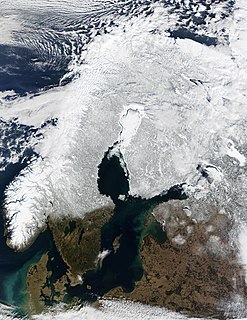
Scandinavia is a subregion in Northern Europe, with strong historical, cultural, and linguistic ties.

The Baltic states or the Baltic countries is a modern unofficial geopolitical term, typically used to group three countries: Estonia, Latvia and Lithuania. All three countries are members of NATO, the European Union, the Eurozone, and the OECD. The three sovereign states on the eastern coast of the Baltic Sea are sometimes referred to as the "Baltic nations", less often and in historical circumstances also as the "Baltic republics", the "Baltic lands", or simply the Baltics.
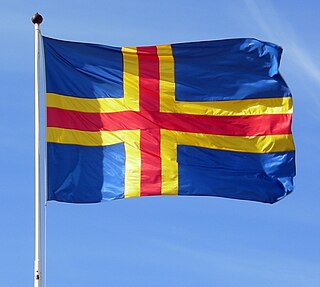
Åland has a rich history. Humans first reached the archipelago in the Neolithic period ca. 4000BC.

Mariehamn is the capital of Åland, an autonomous territory under Finnish sovereignty. Mariehamn is the seat of the Government and Parliament of Åland, and 40% of the population of Åland live in the city. It is mostly surrounded by Jomala, the second largest municipality in Åland in terms of population; to the east it is bordered by Lemland. Like all of Åland, Mariehamn is unilingually Swedish-speaking and around 88% of the inhabitants speak it as their native language.

The terms Baltic Sea Region, Baltic Rim countries, and the Baltic Sea countries/states refer to slightly different combinations of countries in the general area surrounding the Baltic Sea, mainly in Northern and Eastern Europe.
Viasat was a satellite and pay television brand, co-owned by the Swedish media group Nordic Entertainment Group (NENT) in the Nordic countries, Sony Pictures Television in Hungary, and by Viasat World internationally. Founded in Sweden in 1991, Viasat has previously been owned by Modern Times Group. The channels of both companies were broadcast from London.

Finns or Finnish people are a Baltic Finnic ethnic group native to Finland.

The UCL School of Slavonic and East European Studies is a school of University College London (UCL) specializing in Central, Eastern and South-Eastern Europe, Russia and Eurasia. It teaches a range of subjects, including the history, politics, literature, sociology, economics and languages of the region. It is Britain's largest centre for study of Central, Eastern and South-Eastern Europe and Russia. It has links with universities across Europe and beyond.
Viasat Explore is a television channel owned by international media company, Viasat World LTD. The channel focuses on fishing, adventure, men at work and engineering. Viasat Explore is a 24-hour channel broadcasting in Russia and Commonwealth of Independent States.
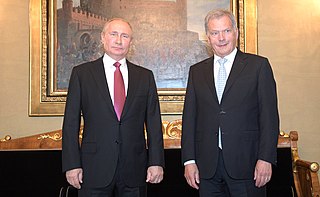
Finland–Russia relations have been conducted over many centuries, from wars between Sweden and Russia in the early 18th century, to the planned and realized creation and annexation of the Grand Duchy of Finland within the Russian Empire during Napoleonic times in the early 19th century, to the dissolution of the personal union between Russia and Finland after the abdication of Russia's last czar in 1917, and subsequent birth of modern Finland, with support of the bolshevik (Soviet) Russian government. Finland had its own civil war with minor involvement by Soviet Russia, was later invaded by the USSR, and had its internal politics influenced by it. Relations since then have been both warm and cool, fluctuating with time. Russia has an embassy in Helsinki, a consulate-general in Turku and consulates in Lappeenranta and Mariehamn. Finland has an embassy in Moscow, a consulate-general in Saint Petersburg and two branches of the consulate.
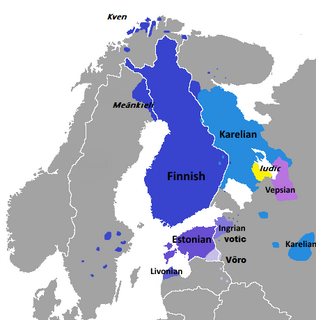
The Baltic Finnic or Balto-Finnic peoples, also referred to as the Baltic Sea Finns, Baltic Finns, sometimes Western Finnic and often simply as the Finnic peoples, are the peoples inhabiting the Baltic Sea region in Northern and Eastern Europe who speak Balto-Finnic languages. They include the Finns, Estonians, Karelians, Veps, Izhorians, Votes, and Livonians. In some cases the Kvens, Ingrians, Tornedalians and speakers of Meänkieli are considered separate from the Finns.

The Swedish Empire was a European great power that exercised territorial control over much of the Baltic region during the 17th and early 18th centuries. The beginning of the empire is usually taken as the reign of Gustavus Adolphus, who ascended the throne in 1611, and its end as the loss of territories in 1721 following the Great Northern War.

The Soviet occupation of the Baltic states covers the period from the Soviet–Baltic mutual assistance pacts in 1939, to their invasion and annexation in 1940, to the mass deportations of 1941.

Estonia, officially the Republic of Estonia, is a country in northern Europe. It is bordered to the north by the Gulf of Finland across from Finland, to the west by the Baltic Sea across from Sweden, to the south by Latvia, and to the east by Lake Peipus and Russia. The territory of Estonia consists of the mainland, the larger islands of Saaremaa and Hiiumaa, and over 2,200 other islands and islets on the eastern coast of the Baltic Sea, covering a total area of 45,339 square kilometres (17,505 sq mi). The capital city Tallinn and Tartu are the two largest urban areas of the country. The Estonian language is the autochthonous and the official language of Estonia; it is the first language of the majority of its people, as well as the world's second most spoken Finnic language.
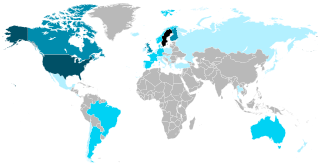
Swedes are a North Germanic ethnic group native to the Nordic region, primarily their nation state of Sweden, who share a common ancestry, culture, history and language. They mostly inhabit Sweden and the other Nordic countries, in particular Finland where they are an officially recognized minority, with a substantial diaspora in other countries, especially the United States.
The Warsaw Accord was signed on 17 March 1922 by Finland, Poland, Estonia and Latvia, but failure by the Parliament of Finland to ratify it made it never enter into force.















